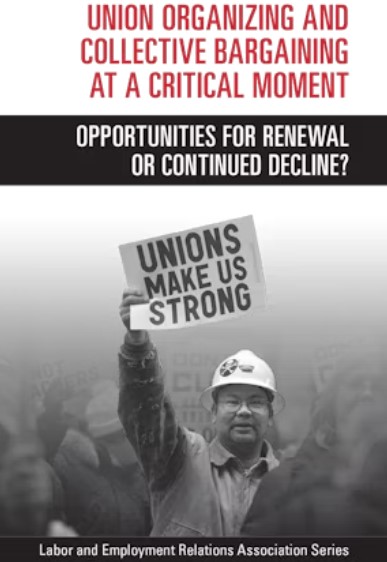 Union Organizing and Collective Bargaining at a Critical Moment: Union Organizing and Collective Bargaining at a Critical Moment:
Opportunities for Renewal or Continued Decline?
Edited by Howard R. Stanger, Paul F. Clark, and John T. Delaney
Union decline over the past 50 years is due to a number of factors that have negatively reinforced each other. Notable factors include structural shifts in the economy, employer opposition, weak labor laws, legislation that has substituted for union protection, the growth of human resources, and the inability of unions to respond to institutional threats with new and successful organizing and political strategies. But a number of contemporary developments suggest a revival of interest in unions. Before COVID, workers experienced less input than they expected and desired. Because unions are the main mechanism for providing workers with a greater voice in the workplace, this voice gap provides an opportunity for union growth.
The voice and representation gap is evident in the many organizing drives taking place in previously unorganized sectors, such as fast food, retail, warehouses, high tech, and digital media. Unions, union organizing, and collective bargaining may finally see a change in fortune after decades of stagnation and decline.
|
|
Read more...
|
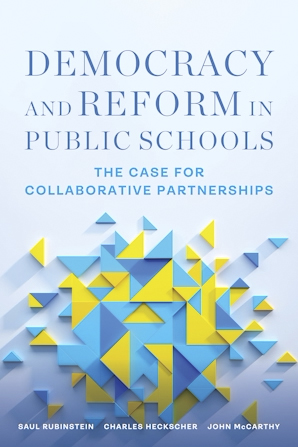 Democracy and Reform in Public Schools Democracy and Reform in Public Schools
By Saul Rubinstein, Charles Heckscher, and John McCarthy
A thought-provoking examination of how public education systems can be strengthened through strategic relationships both within schools and with outside partners.
In Democracy and Reform in Public Schools, Saul Rubinstein, Charles Heckscher, and John McCarthy apply their expertise in labor relations to public school reform. They envision a model of K–12 education that shifts away from the tenets of neoliberalism and centers on productive collaboration among school boards, school administrators, teacher unions, and other education stakeholders.
|
|
Read more...
|
 Overtime Overtime
America's Aging Workforce and the Future of Working Longer
Edited by Lisa F. Berkman and Beth C. Truesdale
Overtime offers a current, revelatory corrective to our understanding of the future of the American workforce and aging. Experts across economics, sociology, psychology, political science, and epidemiology examine how increasing economic and social inequalities, coupled with changes across generations or birth cohorts, call for a rethinking of the working-longer policy framework. The contributors examine trends and inequalities in employment, health, family dynamics, and politics, helping to shed light on the challenges faced by traditionally marginalized social groups while showing that our society's responses to an aging workforce affect us all. Together, they argue that policies affecting work must be considered alongside policies affecting retirement and provide a path forward to achieve better retirement security for all Americans.
|
|
Read more...
|
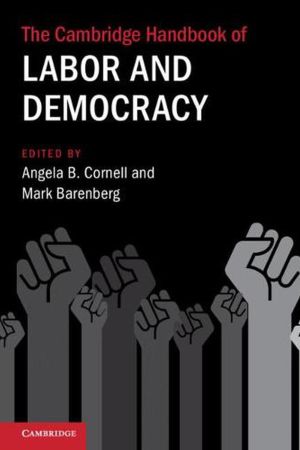 The Cambridge Handbook of Labor and Democracy The Cambridge Handbook of Labor and Democracy
Edited by Angela B. Cornell and Mark Barenberg
We are currently witnessing some of the greatest challenges to democratic regimes since the 1930s, with democratic institutions losing ground in numerous countries throughout the world. At the same time organized labor has been under assault worldwide, with steep declines in union density rates. In this timely handbook, scholars in law, political science, history, and sociology explore the role of organized labor and the working class in the historical construction of democracy. They analyze recent patterns of democratic erosion, examining its relationship to the political weakening of organized labor and, in several cases, the political alliances forged by workers in contexts of nationalist or populist political mobilization.
The volume breaks new ground in providing cross-regional perspectives on labor and democracy in the United States, Europe, Latin America, Africa, and Asia. Beyond academia, this volume is essential reading for policymakers and practitioners concerned with the relationship between labor and democracy.
|
|
Read more...
|
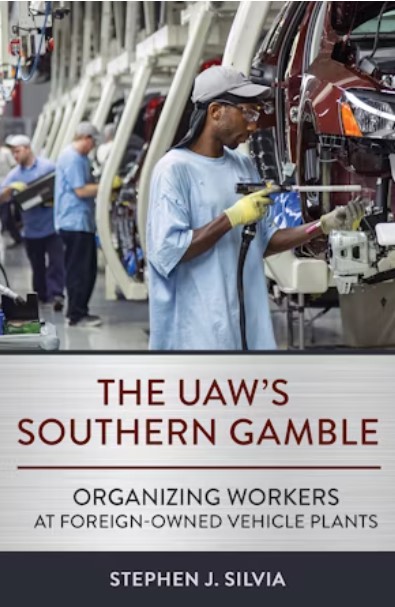 The UAW's Southern Gamble: The UAW's Southern Gamble:
Organizing Workers at Foreign-Owned Vehicle Plants
By Stephen J. Silvia
The UAW's Southern Gamble is the first in-depth assessment of the United Auto Workers' efforts to organize foreign vehicle plants (Daimler-Chrysler, Mercedes-Benz, Nissan, and Volkswagen) in the American South since 1989, an era when union membership declined precipitously. Stephen J. Silvia chronicles transnational union cooperation between the UAW and its counterparts in Brazil, France, Germany, and Japan and documents the development of employer strategies that have proven increasingly effective at thwarting unionization.
Silvia shows that when organizing, unions must now fight on three fronts: at the worksite; in the corporate boardroom; and in the political realm. The UAW's Southern Gamble makes clear that the UAW's failed campaigns in the South can teach hard-won lessons about challenging the structural and legal roadblocks to union participation and effectively organizing workers within and beyond the auto industry.
|
|
Read more...
|
 What Work Is: What Work Is:
Germany’s Political Economy after the Social Democratic Century
Edited By Tobias Schulze-Cleven and Sidney A. Rothstein
Germany is a central case for research on comparative political economy, which has inspired theorizing on national differences and historical trajectories. This book assesses Germany’s political economy after the end of the "social democratic" 20th century to rethink its dominant properties and create new opportunities for using the country as a powerful lens into the evolution of democratic capitalism.
Documenting large-scale changes and new tensions in the welfare state, company strategies, interest intermediation, and macroeconomic governance, the volume makes the case for analyzing contemporary Germany through the politics of imbalance rather than the long-standing paradigm of institutional stability. This conceptual reorientation around inequalities and disparities provides much-needed traction for clarifying the causal dynamics that govern ongoing processes of institutional recomposition. Delving into the politics of imbalance, the volume explicates the systemic properties of capitalism, multivalent policy feedback, and the organizational foundations of creative adjustment as key vantage points for understanding new forms of distributional conflict within and beyond Germany.
|
|
Read more...
|
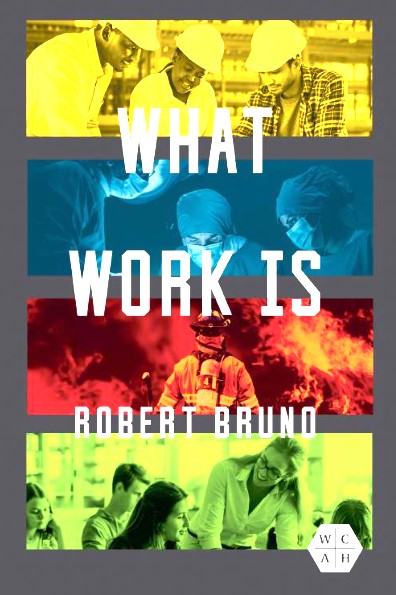 What Work Is: What Work Is:
A Distinctive Exploration of How Workers See Work
By Robert Bruno
For nearly thirty years, Robert Bruno has taught labor history and labor studies to union members from a wide range of occupations and demographic groups. In the class, he asked his students to finish the question “Work is—?” in six words or less. The thousands of responses he collected provide some of the rich source material behind What Work Is. Bruno draws on the thoughts and feelings experienced by workers in the present day to analyze how we might design a future of work. He breaks down perceptions of work into five categories: work and time; the space workers occupy; the impact of work on our lives; the sense of purpose that motivates workers; and the people we work for, in all senses of the term.
|
|
Read more...
|
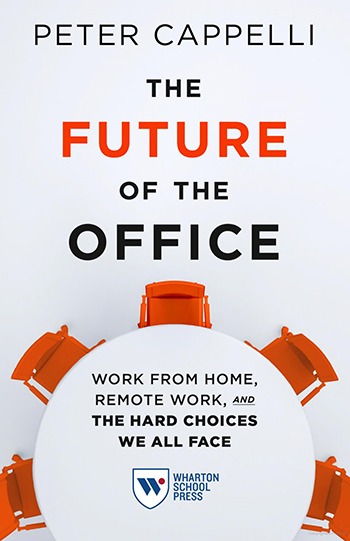 The Future of the Office: The Future of the Office:
Work from Home, Remote Work, and the Hard Choices We All Face
By Peter Cappelli
The COVID-19 pandemic forced an experiment that turned remote work into a “new normal.” Many employees want to keep working remotely, or at least the ability to work occasionally from home. But for employers, the benefits of employees working from home or hybrid approaches are not so obvious. In The Future of the Office: Work from Home, Remote Work, and the Hard Choices We All Face, Peter Cappelli lays out the facts to provide employees and employers with a vision of their futures. He unveils the surprising trade-offs both may have to accept to get what they want.
|
|
Read more...
|
 Clean Air and Good Jobs: Clean Air and Good Jobs:
U.S. Labor and the Struggle for Climate Justice
By Todd E. Vachon
The labor–climate movement in the U.S. laid the groundwork for the Green New Deal by building a base within labor for supporting climate protection as a vehicle for good jobs. But as we confront the climate crisis and seek environmental justice, a "jobs vs. environment" discourse often pits workers against climate activists. How can we make a "just transition" moving away from fossil fuels, while also compensating for the human cost when jobs are lost or displaced?
|
|
Read more...
|
 Work, Retire, Repeat: Work, Retire, Repeat:
The Uncertainty of Retirement in the New Economy
By Teresa Ghilarducci
A damning portrait of the dire realities of retirement in the United States—and how we can fix it.
|
|
Read more...
|
 Inside the Invisible Cage: Inside the Invisible Cage:
How Algorithms Control Workers
By Hatim Rahman
In a world increasingly run by algorithms and artificial intelligence, Rahman traces how organizations are using algorithms to control workers in an "invisible cage."
|
|
Read more...
|
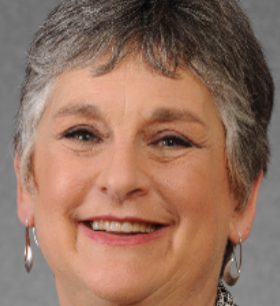 Disconnected: Disconnected:
Call Center Workers Fight for Good Jobs in the Digital Age
By Debbie J. Goldman
Debbie J. Goldman explores how call center employees and their union fought for good, humane jobs in the face of degraded working conditions and lowered wages. As the workforce coalesced to resist the changes, it demanded the Communications Workers of America ight for safe and secure good-paying jobs. But trends in technology, capitalism, and corporate governance--combined with the decline of unions--narrowed the negotiating options for workers. Goldman describes how the actions of workers, management, and policymakers shaped the social impact of the new digital technologies and gave new form to the telecommunications industry in a time of momentous change.
|
|
Read more...
|
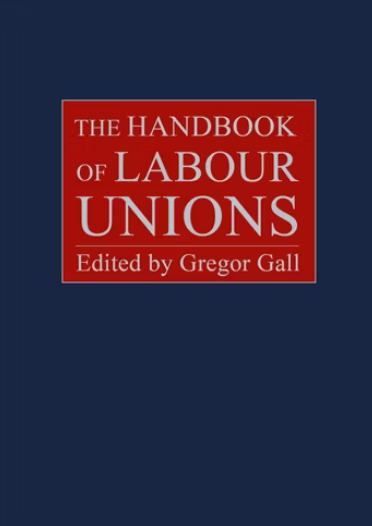 The Handbook on Labour Unions The Handbook on Labour Unions
Edited by Gregor Gall
LERA authors include Mark Bray (University of Newcastle), Marissa Brookes (California – Riverside), Roland Erne (University College Dublin), Lorenzo Frangi (University of Quebec – Montreal), Christian Ibsen (Copenhagen), Johanna MacNeil (RMIT University), Jörg Nowak (University of Brasilia), Zachary Russell (Xavier), Ed Snape (Hong Kong Baptist University), Maite Tapia (Michigan State) and Tingting Zhang (Illinois).
|
|
Read more...
|
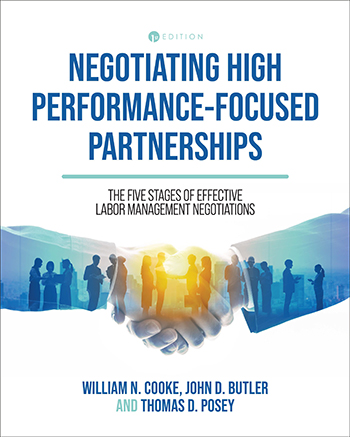 Negotiating High Performance-Focused Partnerships: Negotiating High Performance-Focused Partnerships:
The Five Stages of Effective Labor Management Negotiations
By William N. Cooke, John D. Butler and Thomas D. Posey
Negotiating High Performance-Focused Partnerships: The Five Stages of Effective Labor Management Negotiations investigates labor-management contract negotiations in an operational context. The textbook is designed to guide readers through five key stages of contract negotiations, aiming to align human resources and negotiation strategies with broader business objectives for optimizing workplace performance and institutional competitiveness.
|
|
Read more...
|
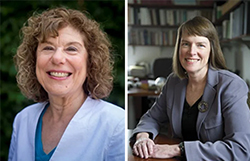 50 Years of Breakthroughs and Barriers 50 Years of Breakthroughs and Barriers
Women in Economics, Policy, and Leadership
Francine D. Blau & Lisa M. Lynch
This NBER paper provides an overview of what has happened over the past fifty years for women as they worked to break through professional barriers in economics, policy, and institutional leadership. It charts the progress of women in higher education at the college level and beyond and then goes on to examine women’s representation at the upper levels of academia, government, law, medicine, and management.
|
|
Read more...
|
 Was the 401(k) a Mistake? Was the 401(k) a Mistake?
Teresa Ghilarducci (The New School) is extensively cited and quoted in The New York Times Magazine story (May 8, 2024): How an obscure 45-year ago tax change transformed retirement and left so many Americans out in the cold.
|
|
Read more...
|
|